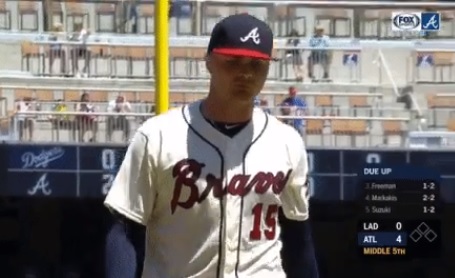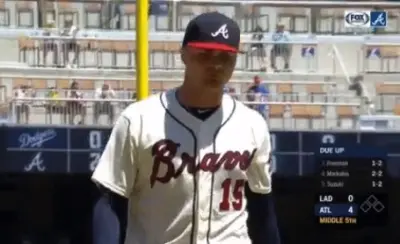
Now that it has become a hobby for Twitter users to dig up racist, sexist, homophobic and other inappropriate things athletes wrote on social media years ago, many players are weighing in on what needs to change. If you ask Sean Doolittle, the problem isn’t just about people forgetting to clean up their old tweets.
On Monday, Doolittle posted an insightful thread on his personal Twitter account. The Washington Nationals reliever called for athletes — young and old — to be more responsible with comments they make and opinions they share publicly.
It’s been a tough couple of weeks for baseball on twitter. It sucks to see racist and homophobic language coming from inside our league – a league I’m so proud to be a part of that I’ve worked really hard to make a more accepting and inclusive place for all our fans to enjoy.
— Sean Doolittle (@whatwouldDOOdo) July 30, 2018
We have to start caring as much about the content of the posts as we do about when they were made and how they came to light.
— Sean Doolittle (@whatwouldDOOdo) July 30, 2018
The answer isn’t for athletes to leave social media. Social media can be great for an athlete. I met my wife on twitter (long story). It helps athletes share their stories and personalities and connect with their community. Besides, it’s not like you can accidentally post a slur.
— Sean Doolittle (@whatwouldDOOdo) July 30, 2018
A lot of the tweets that have surfaced are from several years ago – from a time in their lives when they may not have realized the impact those words have. But as you learn from and grow out of that youthful indescretion, delete those posts to reflect that growth.
— Sean Doolittle (@whatwouldDOOdo) July 30, 2018
Between all the people you meet and the places you go, there is a lot of opportunity for personal growth in baseball. It’s entirely possible that those old posts no longer reflect that person’s views. But actions will speak louder than words.
— Sean Doolittle (@whatwouldDOOdo) July 30, 2018
It’s a reminder that words matter, and that the impact the of words matter more than the intent. Rather than feeling like this platform makes us targets and we have to censor ourselves, find a way to use the platform to lift others up and make a positive impact.
— Sean Doolittle (@whatwouldDOOdo) July 30, 2018
It can be tough for athletes to understand why these words are so hurtful. Most of us have been at the top of the food chain since HS, immune to insults. When all you’ve known is success and triumph it can be difficult to empathize with feeling vulnerable or marginalized.
— Sean Doolittle (@whatwouldDOOdo) July 30, 2018
Homophobic slurs are still used to make people feel soft or weak or otherwise inferior – which is bullshit. Some of the strongest people I know are from the LGBTQIA community. It takes courage to be your true self when your identity has been used as an insult or a pejorative.
— Sean Doolittle (@whatwouldDOOdo) July 30, 2018
Homophobic slurs are still used to make people feel soft or weak or otherwise inferior – which is bullshit. Some of the strongest people I know are from the LGBTQIA community. It takes courage to be your true self when your identity has been used as an insult or a pejorative.
— Sean Doolittle (@whatwouldDOOdo) July 30, 2018
It’s a privilege to play in the major leagues and we have an obligation to leave the game better than we found it. There’s no place for racism, insensitive language or even casual homophobia. I hope we can learn from this and make the MLB a place where all our fans feel welcome.
— Sean Doolittle (@whatwouldDOOdo) July 30, 2018
On Sunday, both Atlanta Braves pitcher Sean Newcomb and Washington Nationals shortstop Trea Turner were forced to apologize after some offensive tweets they sent years ago resurfaced. You would think they would have learned after what happened to a star college basketball player during the NCAA Tournament. And if that wasn’t enough of a warning, the same exact thing happened to a fellow MLB player during the All-Star Game.
While it’s easy to excuse ignorant things athletes tweet when they’re teenagers, that doesn’t make them right. Doolittle’s thoughts on the issue make a lot of sense.


